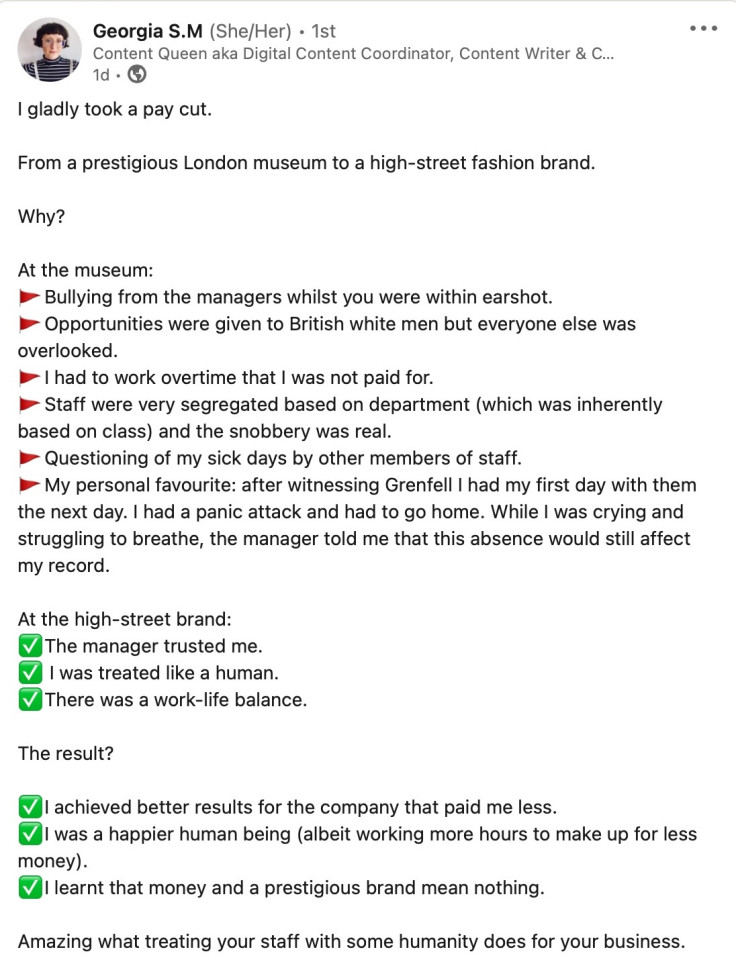Londoner Shares Why She Quit Her Job at a Prestigious Museum and is Happier Getting Paid Less
"I suffered a lot of anxiety at the museum, and it got to the point I couldn't even go in..."

Data found by UKG, a multinational technology company that provides human resource management services, exposed how managers have just as much of an impact on people's mental health as their spouses.
A UKG survey, which studied ten countries across the globe, found that 69 per cent of people have their mental well-being affected by their manager – equal to those who admitted that their spouse influenced their mental health.
Pat Wadors, the Chief People Officer at UKG, said: "We talk a lot about mental health in terms of a medical diagnosis or burnout. While those are serious issues, the day-to-day stressors we live with — especially those caused by work — are what we should talk more about as leaders."
"Authentic, vulnerable leadership is the key to creating belonging at work, and, in turn, the key to solving the mental health crisis in the workplace."
The survey also found that 81 per cent of the employees said they would prioritise their mental state over a high-paying job, and 40 per cent were prepared to quit their jobs within the next 12 months to avoid work-related stress.
Having chosen to prioritise their mental health, 64 per cent went on to admit that they were also willing to take a pay cut for a job that better supports their mental well-being.
"I gladly took a pay cut," said Content Writer and Curator Georgia S.M.
After recently quitting her job at a prestigious London Museum and becoming employed by a high street brand, Georgia said she has finally mastered a work-life balance.
In her previous job post, Georgia opened up about how she was bullied by her managers, treated differently to men in the workplace and forced to work overtime.
Despite being employed in a high-paid role at a London museum to protect her mental health, Georgia told International Business Times UK that she left her job post for a lower-paid assistant role in retail.
After quitting her job, the current content writer said that she went on to develop a trusting relationship with her new manager, achieved better results and "learnt that money and a prestigious brand mean nothing".

Why did you decide to work in a museum, and why were you so excited by this opportunity?
Georgia: "The money was really good and the museum is really well known, so I thought it would help with opportunities. I could learn things, meet interesting people and be surrounded by art. I also held a BA in history and politics, so I thought it was the perfect starting point to network. I was wrong."
Were there any working conditions at the museum different from other jobs?
Georgia: "We had to come in 15 minutes before and leave 10-15 minutes after our shift ended. This was unpaid but mandatory."
What issues did you have with management staff?
Georgia: "A manager was talking about me with a colleague while I was within earshot. [He was] glaring at me and made no effort to hide it. This happened on more than one occasion."
"The same manager refused to help me when I went with a customer service issue. He would refuse to help and instead offered a sarcastic comment."
"Another more senior manager spoke while I was having a panic attack - saying that my going home would count as a day off on my probation. I had just witnessed Grenfell, I live close by, so I was in shock."
Why did you decide to resign? Was there a breaking point?
Georgia: "The breaking point was the constant bullying, the constant ganging up of other colleagues and the unwillingness to do anything about it."
"I know two other people who also left within a week or so of me leaving."
In your retail job, how significant was the pay decrease?
Georgia: "The pay in the museum was £10 to £11. The high street retail company was £7.50 to £8.50. This was all per hour."
Instead of wages, what did you prioritise while looking for a new job?
Georgia: "Being treated like a human. There seemed to be a bit of a class divide and a culture divide if I'm honest, the place I left the museum for had none of that."
What is your relationship with your new managers, and how are the working conditions different from the museum's (breaks and shift hours)?
Georgia: "I suffered a lot of anxiety at the museum, and it got to the point I couldn't even go in. I work for myself now, for a reason."
What advice would you give those who are unhappy in their current job but worried about getting decreased wages in new employment?
Georgia: "To be honest, I have no advice... How can people just switch their job for one that pays less when the cost of living is this high and the job market is so difficult."
"I had no kids, no mortgage, so it was easier for me. Plus, I had an opportunity to work more to make up the money - and even if people did have that option, they still might not be able to."
© Copyright IBTimes 2025. All rights reserved.






















